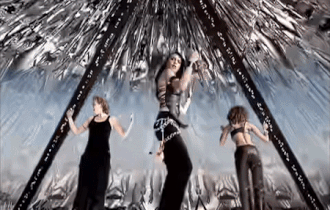Released: 23rd October 2000
Writers: Rodney Jerkins / LaShawn Daniels / Fred Jerkins III / Victoria Beckham / Melanie Brown / Emma Bunton / Melanie Chisholm
Peak position: #1
Chart run: 1-3-10-22-31-38-39-43-46-42-46-62-54-54-64-66-69
The release of Holler / Let Love Lead The Way marked a massive moment for the Spice Girls as they launched their first ‘proper’ single as a four-piece. But following the departure of Geri Halliwell and with the group’s blossoming solo endeavours, could things really stay the same? Well, as it turns out, that was never an option as the Spice Girls struck out with an (almost) entirely new sound.

Holler is all too often dismissed as ‘the Spice Girls doing R&B’, but that belies the investment which was poured into the Forever project. Moving away from the team that had guided them to this point was a controversial move, but the album credits read like a who’s who of top R&B producers (Rodney Jerkins, LaShawn Daniels, Harry Mason Jr., Jimmy Jam and Terry Lewis). While there’s no doubt that the prospect of working with the Spice Girls was a financially lucrative one, it’s also a testament to how well respected they were that they could gather so many big names – all of whom were in a position to decline the offer – in one place. Forever was a deliberate departure and early pop-sounding tracks were completely remixed (or abandoned altogether) to fit the new vision. It also marked a change of pace for the Spice Girls. Spiceworld was famously assembled with urgency, but this time around the group was in a position to press pause on the process. Which is precisely what they did; the recording sessions were split around their growing solo commitments

Some Spice Girls fans refuse to reconcile the fact that Forever belongs within the group’s canon. To a certain extent, this is symptomatic of the way the project was handled. It’s impossible to dismiss the sense that this felt like a contractual obligation; the rote promotion was executed with regimented, fragmented precision. Now absent was the façade of five – or even four – friends on a chaotic, whirlwind adventure. Behind-the-scenes reports from the album launch party painted a pretty bleak picture, not of a group who had fallen out, but of one that was exhausted. With all of them having launched solo projects in the time between Spiceworld and Forever, they were now dealing with intense media scrutiny as individuals as well as a collective. There is a certain irony to the fact that in trying so hard to prove there was life after Geri Halliwell for the Spice Girls, in many people’s eyes, they’d ended up doing quite the opposite.

Even the most ardent fans of Holler would probably concede that the amount of enjoyment one gleans from it depends on the extent to which you can disassociate it from the singles that preceded it. That said, to deny Forever means overlooking a core component of the Spice Girls’ DNA. They had always drawn on R&B as an influence, particularly on the Spice album. Admittedly, that wasn’t the image outwardly projected via the singles, so Holler might have felt like a jarring transition. Still, it shouldn’t have come as a surprise to anyone familiar with the Spice Girls’ material. The major shift was less an increase in R&B and more a reduction in pop sensibility. Put simply, the group had lost their equilibrium. This is not the album that they would have made if Geri Halliwell was still present, but somewhere between Forever and Schizophonic lies the perfect third Spice Girls album.

The other reason Forever feels somewhat detached from the rest of the Spice Girls’ material is that up until this point, they had loosely told the story of their career via the music they released. Songs like Wannabe, Spice Up Your Life, Viva Forever and Goodbye were rooted – intentionally or otherwise – with the group’s narrative. The obvious track to do that this time was Right Back At Ya, but there’s a sense the Spice Girls wanted to maximise the impact of their comeback in the shortest time possible. Holler was, thus, a statement of musical intent and nothing more; however, it was easily the best choice to showcase their new material.

With such baggage to contend with, it might have been simpler to digest if this was a bad song. At least then it could all be written off as an ill-advised experiment (as many commentators did). But that’s not the case at all; Holler is so, so good. Even though it was released as a double-A side, this track was the focal point of the Spice Girls’ comeback. Let Love Lead The Way – while gorgeous – felt like it was hastily added to placate growing discord over the stark contrast in sound (it’s telling that the two music videos essentially employ the same concept). The uplift in production values – courtesy of Rodney Jerkins, in this case – is immediately evident. The jaunty beat and energetic clap-click production place this definitively at a specific time and place within pop music; it’s so distinctive that the phoned-in vocal date-stamp which opens the song: “Spice Girls…Darkchild, 2000” is rendered entirely unnecessary. The Spice Girls might have been built up as a quintessentially British pop group, but here they move slicker, sharper and – whether anyone wanted it or not – pull off an impressively authentic Americanised sound.

Holler had a more formidable job than most Spice Girls singles in that it now had to condense four musical identities – rather than just personalities – into one song. Yet, none of them sounds out of place here; despite everything, there is still undeniable electricity about having the four women together that elevates their performance. And now, with one less member, a more even split of vocal duties. There are some terrific moments here; Emma Bunton dripping sass at the start of the second verse: “So what you gonna do, now that I got you with me, you’ve gotta show me boy ’cause nothing comes for free…” and we cannot forget Victoria Beckham’s iconic: “Hollah, HOLLAH!” ad-libs. Yes, that’s right, the traditional Spice Girls formula is turned on its head with every part of Holler up for grabs. The result is a song made up of a finely interwoven patchwork of individual contributions – including a frantic, juddering breakdown from Darkchild himself – but one which (just) manages not to sound like four solo singers who happen to be singing the same track.

Holler also manipulates the Spice Girls’ vocals in a way that previous producers hadn’t. There’s a measured – but no less lavish – use of vocoder that occasionally sees the group’s voices become little more than digital feedback, which adds further depth to the layering of the song, as well as a degree of playfulness. And that’s the thing: Holler is actually a lot of fun. No, it’s not so raucously chaotic a comeback as Spice Up Your Life, but neither is it a po-faced attempt at credibility. The bouncy chorus contains some irrepressible hooks, and while the lyrics are more overtly sexual: “I wanna make you holler, and hear you scream my name, I’ll give you rules to follow, so you can play my game”, Holler never comes across so strait-laced as it reads. The Spice Girls might have lost sight of their legacy, but it hadn’t been forgotten altogether because as sex-bops go, this one is cheeky and light-hearted. So sure, the track could – in theory – have been recorded by any pop/R&B act of the time. But would it have been quite the same with someone else performing it? Not a chance.

If the ambition with Holler was to align it with the commercial R&B dominating the American charts, then the music video very much follows through with the same concept. Taking place inside a giant computer-generated glass pyramid where each member of the group represents one of the elements (and if that sounds familiar, it’s because exactly the same concept was used in Let Love Lead The Way), it still looks insanely big-budget even two decades on. There is nothing – objectively – wrong with the video; it looks phenomenal. However, it forgets the most crucial aspect: context. This was the first time the Spice Girls had appeared together in a music video for nearly two years (a lifetime by ‘90s/’00s standards). Therefore, it’s puzzling that the video almost completely neglects to portray the group together. There are a lot of solo shots, which are undeniably vibrant and use every opportunity to showcase the impressive amount of CGI being thrown at the aesthetic. But even where the Spice Girls are performing together, the direction seems intent on keeping them apart. Standing in the middle of the pyramid, they spend most of the time with their backs to each other. It’s almost as if the choreography had been rehearsed separately (entirely possible) and then staged to try and disguise that fact. At any other stage of the album campaign, the video for Holler would have been perfect. But for a single that desperately needed to reinforce the ‘friendship never ends’ angle, the result is something that simply reinforced a growing sense of fragmentation.

Holler/Let Love Lead The Way duly debuted at #1 in the UK upon its release. Taking the single at face value, it was business as usual for the Spice Girls. But this was a group who were commercially much weaker than they were before. The track registered first-week sales of 106,000, which was far from the lowest of 2000, but nowhere near the highest. What should – in theory – have been one of the most bankable singles of the year turned in an entirely average performance. Nevertheless, it cemented the Spice Girls’ position on the list of all-time chart-topping acts, where they remain the most successful girl group with nine #1 singles (their next closest rival being the Sugababes with six). Forever, on the other hand, didn’t fare quite so well. It debuted at #2 in the UK – hardly a failure – but the real story was in the chart battle that ensued. Pitched against Westlife, this became perceived as a tussle of relevance with no room for a runner-up. When the Spice Girls failed to top the chart, it was presented as a giant-slaying change of the guard. #2 – as far as the media was concerned – proved that the group was done. Whatever willingness the Spice Girls might have had to invest more time into the Forever campaign surely dissipated at this point.

But credit where it’s due to the group. While most acts in their position would be tempted to try and sweep such a divisive single under the rug and pretend it never happened, the Spice Girls – as ever – have defied convention. Holler and Let Love Lead The Way have continued to feature in their live shows (they even roped Geri Halliwell into performing it during the Spice World – 2019 Tour). However mired in ambivalence the Forever campaign might have been, it’s right that the Spice Girls still celebrate Holler. It’s a brilliant pop song that is – and should remain – an integral part of the group’s history.



